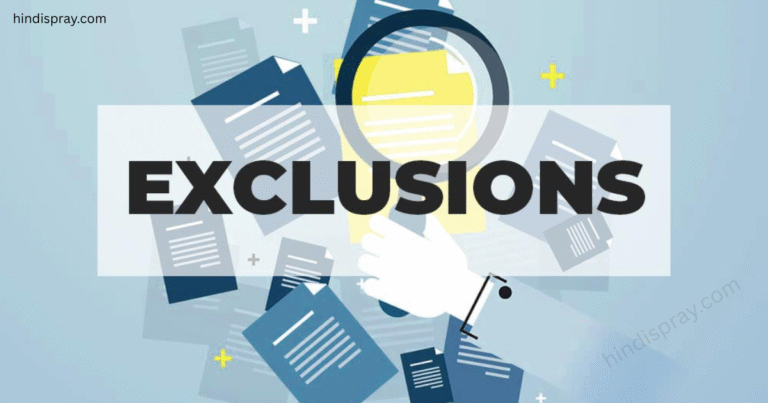Insurance policies are designed to protect individuals from unforeseen risks and financial losses. Whether it’s health, home, auto, or life insurance, the coverage provided by these policies can be a safety net in times of need. However, what many policyholders may not realize is that insurance policies often come with exclusions – situations, conditions, or events that are not covered under the policy terms. Understanding these exclusions is crucial for ensuring that policyholders know when they may not be protected and can make informed decisions when purchasing insurance.
In this article, we will delve deep into the concept of insurance exclusions, explore common examples, and explain why exclusions exist in insurance policies. We will also provide tips on how to navigate these exclusions and what you can do if you encounter them.
What Are Insurance Exclusions?
Insurance exclusions refer to specific circumstances or situations that are not covered by an insurance policy. These exclusions are deliberately stated in the insurance contract and are usually listed in a separate section, often referred to as the “Exclusions” or “Limitations” section. Exclusions can vary greatly depending on the type of insurance, the insurer, and the specific terms and conditions of the policy.
Why Do Insurance Policies Have Exclusions?
Exclusions serve several purposes for both the insurer and the policyholder. For the insurer, exclusions help to manage risk and ensure that the insurance policy remains financially sustainable. By excluding certain high-risk events or circumstances, insurers can keep premiums affordable for a wide range of policyholders. Additionally, exclusions can help prevent fraudulent claims and limit the scope of coverage to the original intent of the policy.
For the policyholder, exclusions can provide clarity on what is and isn’t covered, allowing them to make informed decisions about whether additional coverage (or a different policy) is needed to fill those gaps.
Types of Insurance Exclusions
Insurance exclusions can fall into several categories, depending on the type of insurance. Let’s explore some of the most common exclusions found in different types of insurance policies.
1. Health Insurance Exclusions
Health insurance is one of the most common areas where exclusions apply. While health insurance typically covers a wide range of medical treatments, there are numerous exclusions that could leave policyholders unprotected in certain situations. Common exclusions in health insurance policies include:
- Cosmetic Surgery: Most health insurance policies exclude coverage for procedures deemed to be cosmetic or elective in nature, such as rhinoplasty, liposuction, or Botox treatments.
- Pre-existing Conditions: Some health insurance plans may not cover medical treatments for pre-existing conditions, or they may have a waiting period before coverage begins for these conditions.
- Alternative Treatments: Treatments like acupuncture, chiropractic care, or herbal medicine may be excluded in some health insurance policies.
- Experimental Treatments: Medical treatments or procedures that are still in the experimental phase, and have not been proven effective, may not be covered under standard health insurance plans.
- Maternity and Pregnancy: While many plans cover maternity care, some policies may exclude pregnancy-related expenses unless specifically mentioned.
2. Auto Insurance Exclusions
Auto insurance provides financial protection for drivers in the event of an accident or damage to their vehicle. However, auto insurance policies often come with exclusions, including:
- Intentional Damage: If the policyholder causes damage to their own vehicle intentionally, it is usually excluded from coverage.
- Driving Under the Influence (DUI): Damages that occur while driving under the influence of alcohol or drugs may be excluded from the policy.
- Racing or Reckless Driving: If the insured vehicle is involved in illegal racing or reckless driving, the policy may not cover damages or injuries sustained in those situations.
- Unlicensed Drivers: If an uninsured or unlicensed driver operates the vehicle, the insurer may deny a claim.
- Wear and Tear: Damage resulting from general wear and tear, mechanical breakdown, or lack of maintenance is typically not covered.
3. Home Insurance Exclusions

Homeowners insurance is designed to protect a property and its contents from various perils, but there are exclusions that can affect coverage in certain situations. Some common home insurance exclusions include:
- Flood Damage: Many standard home insurance policies exclude coverage for damage caused by floods. Separate flood insurance is typically required to cover flood-related damage.
- Earthquakes: Damage caused by earthquakes is often excluded from basic home insurance policies. Homeowners may need to purchase additional earthquake coverage.
- Pest Damage: Damage from pests, such as termites or rodents, is typically not covered under standard home insurance policies.
- Negligence: If the policyholder fails to maintain the property or causes damage through negligence, the insurer may deny the claim.
- Intentional Damage: Just like with auto insurance, intentional damage caused by the homeowner may not be covered by the policy.
4. Life Insurance Exclusions
Life insurance is designed to provide financial protection to beneficiaries in the event of the policyholder’s death. However, there are certain exclusions that apply to life insurance policies, such as:
- Suicide: Many life insurance policies exclude coverage if the policyholder dies by suicide within the first two years of the policy. After this period, suicide may be covered, depending on the terms of the policy.
- High-Risk Activities: Some life insurance policies exclude coverage for deaths resulting from high-risk activities such as skydiving, scuba diving, or mountaineering.
- Homicide: If the policyholder’s death is ruled to be the result of their own criminal actions, the policy may not provide a payout to the beneficiaries.
- Substance Abuse: If the policyholder dies as a result of drug or alcohol abuse, the insurance company may exclude coverage.
- War or Terrorism: Deaths that occur as a result of war or terrorist activities may be excluded from coverage.
5. Travel Insurance Exclusions
Travel insurance can provide coverage for a range of travel-related events, such as trip cancellations, lost luggage, or medical emergencies abroad. However, certain events may be excluded from coverage:
- Pre-existing Health Conditions: Travel insurance often excludes coverage for medical issues that are related to pre-existing health conditions.
- High-Risk Activities: Adventure activities such as bungee jumping, paragliding, or mountaineering may not be covered under standard travel insurance policies.
- Non-refundable Costs: Some travel insurance policies do not cover non-refundable expenses such as certain airline tickets or hotel reservations.
- Acts of War: If a policyholder is injured or killed in a region experiencing political unrest or war, the insurance policy may not cover the claim.
- Unforeseen Weather Events: Certain weather-related events may not be covered, especially if they are considered normal or foreseeable events like hurricanes or snowstorms in certain locations.
How to Navigate Insurance Exclusions
It’s important to be aware of the exclusions in your insurance policy so that you can plan accordingly. Here are some strategies for navigating insurance exclusions:
1. Read the Fine Print
Always read the terms and conditions of your policy carefully before signing it. Pay particular attention to the “Exclusions” section to understand the situations that are not covered. If anything is unclear, don’t hesitate to ask your insurance provider for clarification.
2. Consider Additional Coverage
If you feel that certain exclusions leave gaps in your protection, consider purchasing additional coverage or riders to address those needs. For example, if you live in a flood-prone area, consider adding flood insurance to your home policy.
3. Evaluate Your Risk Factors

Think about the types of risks you face in your daily life, and evaluate whether your current policy provides adequate protection. For example, if you frequently travel for business or leisure, you may want to ensure that your travel insurance covers a wide range of potential issues.
4. Stay Up-to-Date
Insurance policies can change over time, so it’s important to regularly review your policy to make sure you’re still adequately covered. If you make any significant changes to your life, such as moving to a new location or purchasing a new vehicle, notify your insurer and adjust your coverage as needed.
Also Read: Is Instant Insurance Reliable? Here’s What You Need To Know
Conclusion
Insurance exclusions are a critical part of understanding what is and isn’t covered by your policy. By familiarizing yourself with the exclusions in your insurance contracts, you can avoid unpleasant surprises and ensure that you’re adequately protected in case of unforeseen events. Always read the fine print, assess your risks, and consider supplemental coverage if necessary to fill any gaps. Remember that exclusions exist to protect both the insurer and the insured from high-risk situations and to maintain affordable premiums for policyholders. Understanding and navigating these exclusions is key to ensuring that you get the most out of your insurance policy.
FAQs
1. Why do insurance policies have exclusions?
Exclusions help insurers manage risk and keep premiums affordable while ensuring that the policy’s coverage is clear and specific. They also prevent fraudulent claims and reduce the scope of coverage to what the insurer intends.
2. Are all exclusions the same across insurance providers?
No, exclusions can vary greatly from one insurer to another. It’s important to carefully read the terms of your specific policy, as exclusions will be outlined there.
3. Can exclusions be added to or modified in an insurance policy?
Some exclusions can be modified by adding endorsements or riders to the policy. If there are exclusions you are concerned about, such as flood coverage in a home insurance policy, you may be able to purchase additional coverage for those risks.
4. What should I do if I’m unclear about an exclusion in my policy?
If you’re unsure about an exclusion in your policy, reach out to your insurance provider for clarification. Understanding your policy is key to ensuring you have the protection you need.
5. Can I appeal an insurance claim denial due to an exclusion?
If a claim is denied due to an exclusion, you may be able to appeal the decision. This process can involve submitting additional information or evidence that might indicate your situation fits within the coverage. Always review your policy and consult your insurance company for guidance on how to proceed.

